
15/08/2023 by Stillorgangas 0 Comments
Behind Closed Doors: What Technicians Look for During Your Gas Boiler Service
In the blog's introduction, we underscore the significance of consistent gas boiler servicing to ensure safety, efficiency, and longevity. We provide a concise preview of the key elements technicians scrutinize during a service, offering readers a glimpse into the meticulous assessment that takes place behind the scenes.
The Initial Inspection of Gas Boiler
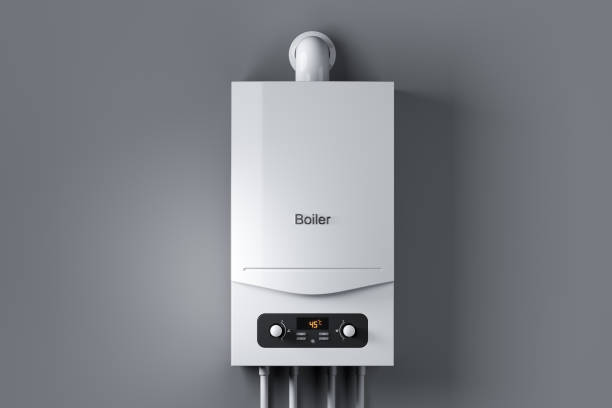
A. The initial inspection of a gas boiler serves as the foundation for a comprehensive service. Technicians carefully assess the external condition of the boiler, checking for any visible signs of wear, corrosion or damage. This step is important, as it allows them to identify potential issues that may affect boiler performance or safety over time. By checking external components, technicians can quickly address any concerns, ensuring boiler longevity and reliability.
B. In addition to external checks, technicians perform the important task of verifying gas connections and fittings. This includes a detailed assessment of the connections that supply gas to the boiler. Any loose or faulty connection can lead to a gas leak, posing a serious safety hazard. By thoroughly inspecting these components, technicians ensure that all connections are secure and in optimal working condition. This proactive approach minimizes the risk of gas leakage, which can result in health hazards or even potential explosions.
The initial inspection sets the stage for a comprehensive service, as it allows technicians to lay the groundwork for subsequent evaluation and maintenance operations. By carefully inspecting the external condition of the boiler and ensuring that the gas connections and fittings are secure, technicians protect not only the functionality of the boiler but also the occupants and the surrounding environment.
Combustion analysis of gas boiler
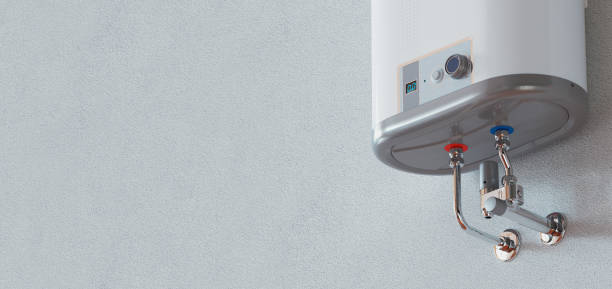
A. Combustion analysis is an important step in gas boiler servicing, which involves accurate measurement of gas pressure and air flow. Technicians use specialized equipment to assess whether gas pressure is aligned with the manufacturer's specifications and ensure proper fuel delivery. Accurate air flow measurement is critical for efficient combustion, reducing energy waste and emissions.
B. Analyzing combustion efficiency provides information on how effectively a fuel is burned to produce heat. This evaluation includes monitoring the gas-to-air ratio and identifying potential irregularities that may compromise efficiency. Optimizing combustion efficiency not only enhances boiler performance but also contributes to energy savings and reducing environmental impact.
C. Based on the analysis, technicians can adjust settings for optimum performance. This may involve fine-tuning the gas-to-air mixture or modifying the ignition timing. These adjustments maximize efficiency, improve heat output and contribute to longer boiler life. Careful combustion analysis ensures that the boiler operates safely and economically, benefiting both homeowners and the environment.
Boiler security security check
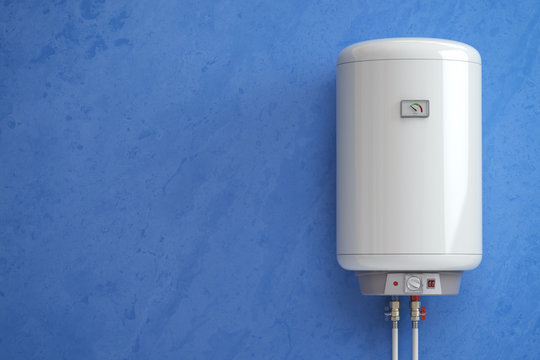
A. Safety checks during gas boiler service include rigorous testing for carbon monoxide leaks, a colorless and odorless gas that poses a serious health risk. Technicians use special detectors to ensure there are no leaks that could endanger the occupants.
B. It is important to inspect the ventilation system to prevent the build-up of harmful gases. Technicians ensure that exhaust gases are being properly directed out of the building, reducing the risk of exposure.
C. Ensuring proper gas combustion safeguards against incomplete combustion, which may produce hazardous byproducts. By carefully evaluating combustion processes, technicians prevent potential safety hazards and help maintain a safe and healthy environment.
Component Inspection and Cleaning of gas boiler
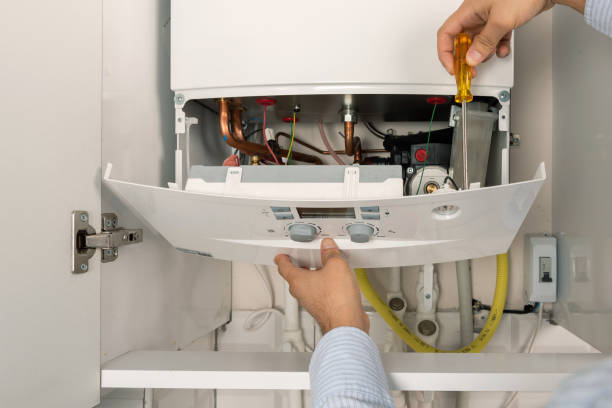
A. Component inspection and cleaning are essential aspects of gas boiler servicing. Technicians carefully examine the burners and heat exchangers, making sure they are free of debris and corrosion. Clean burners and heat exchangers promote efficient heat transfer and combustion, increasing overall performance.
B. It is important to clean or replace the filter to maintain optimum airflow and to prevent dust and debris from clogging the system. Dirty filters can hinder efficiency and put pressure on the boiler, potentially causing it to malfunction. Regular filter maintenance ensures proper air circulation and contributes to a longer lasting system.
C. Lubricating moving parts is a preventive measure that reduces friction and wear. Technicians apply lubricants to motors, fans and other components, reducing the risk of wear and tear and increasing the life of these parts. Well-lubricated components operate smoothly, consume less energy and contribute to a quieter system. Through careful inspection and cleaning, technicians ensure that all components function in harmony, increasing the boiler's longevity and efficiency.
Electrical system test
A. During the electrical system test, technicians carefully test the ignition system to ensure reliable and safe startup. Faulty ignition may result in inefficiency or malfunction.
B. It is important to check the wiring and controls to identify any loose connections or potential hazards. Technicians verify that all components are properly connected and operating as intended.
C. Verifying thermostat functionality is an integral part of the test. Technicians confirm that the thermostat communicates accurately with the gas boiler, efficiently maintaining the desired temperature. This complete electrical inspection ensures uninterrupted operation, prevents breakdowns and enhances boiler performance.
Flue and ventilation assessment
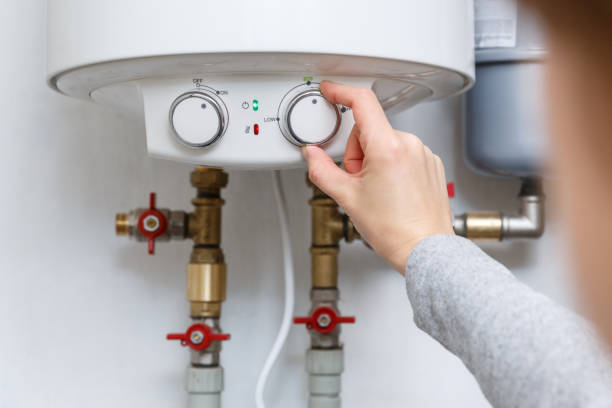
A. Flue and ventilation evaluations include a close inspection of flue pipes and joints to ensure they are secure and free of corrosion. Any problem with the flue can result in a gas leak or poor combustion.
B. Technicians clear blockages and debris from the flue system, preventing blockages that could hinder proper ventilation. A clear path ensures the safe discharge of exhaust gases.
C. It is important to confirm proper exhaust ventilation to prevent the accumulation of harmful gases indoors. Technicians ensure that exhaust gases are effectively vented while maintaining a safe and healthy environment. This evaluation provides protection against potential hazards and ensures optimum ventilation performance.
Water pressure and leakage
A. Technicians check water pressure levels to ensure they are within recommended ranges for optimal boiler operation. Incorrect water pressure may result in inefficiency or damage.
B. Identifying leaks or drips is an important step in preventing water damage and maintaining the integrity of the boiler. If not taken care of, even small leaks can turn into a big problem.
C. Solutions to potential water-related issues include fixing leaks, adjusting pressure, and ensuring proper water circulation. This proactive approach minimizes the risk of damage and ensures reliable operation of the boiler. Water pressure and leak checking contribute to boiler longevity and help homeowners avoid costly repairs in the future.
Efficiency and Performance Appraisal
![]()
A. Efficiency and performance evaluation includes a thorough evaluation of the overall efficiency of the boiler, analysis of factors such as fuel consumption and heat output. Technicians calculate how effectively the system converts fuel into heat.
B. After the assessment, technicians connect with the homeowners to discuss possible improvements. This may include suggestions for optimizing settings, upgrading components, or adopting energy-efficient practices. Collaborating with homeowners to ensure the gas boiler operates at its best, reducing energy consumption and costs and increasing comfort. This evaluation not only enhances boiler performance but also empowers homeowners to make informed decisions about their heating systems.
Maintenance Recommendations
A. Providing maintenance recommendations includes advising homeowners on an appropriate schedule for future servicing. Technicians suggest intervals for regular checks to ensure continued efficiency and safety of the boiler.
B. The technicians also recommend any necessary repairs or replacements based on their evaluation. This includes identifying worn components, potential faults or safety concerns. Clear recommendations enable homeowners to address problems quickly, preventing further damage and disruptions. By providing guidance on both maintenance and repair, technicians help homeowners make informed decisions that extend the boiler's lifespan and ensure its reliable operation.
Conclusion
A. The conclusion underlines the vital role of professional technicians in ensuring optimum performance and safety of gas boilers. Their expertise and careful evaluation contribute to the longevity and efficiency of these systems.
B. The findings highlight the benefits of preventive maintenance, while encouraging homeowners to prioritize regular boiler servicing. By being proactive, homeowners can avoid potential breakdowns, save on energy costs, and enjoy a comfortable and safe home environment. Emphasizing the partnership between technicians and homeowners, the findings empower readers to take actionable steps that enhance the reliability and overall quality of their boilers. Contact Stillorgan Gas for speedy and reliable Gas boiler service.

Comments
Leave a comment